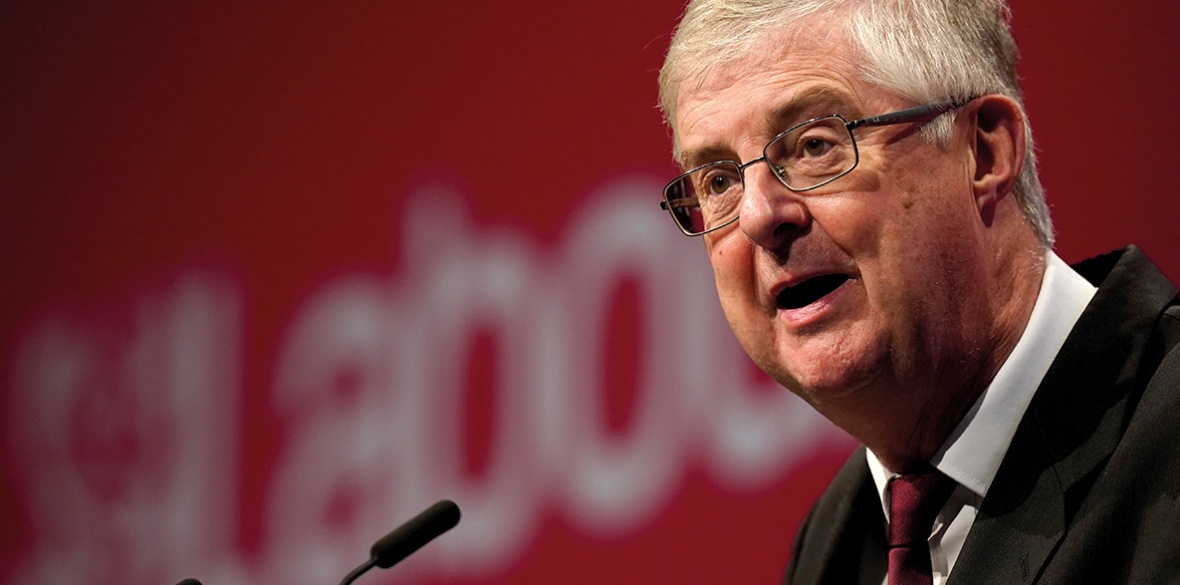This is the last article you can read this month
You can read more article this month
You can read more articles this month
Sorry your limit is up for this month
Reset on:
Please help support the Morning Star by subscribing here
FIRST MINISTER of Wales Mark Drakeford has opinion poll results that show him to be the most trusted party leader in Britain.
His reception at Labour Party conference in Brighton earlier this month bolstered this even more as Drakeford received a standing ovation before he had started speaking.
When I asked him about the rapturous reception he received, Drakeford merely observes that he was glad he managed to get away from Brighton without catching Covid-19.
Also in keeping with the low-key approach he takes to dealing with pressing issues was his response to my probing about the authoritarian approach towards party activists being taken by Sir Keir Starmer and general secretary David Evans.
“I had a good conversation with David at last week’s party conference in Brighton about how devolution inside the party needs to catch-up with devolution at governmental level.
“I think there is a mood within the party in Wales for us to take more responsibility for decisions that apply to members who live in Wales,” Drakeford says.
Drakeford’s own Cardiff West’s then-constituency chair and ally was suspended, with at least eight elected constituency lay officials in Wales having their party membership suspended.
The First Minister acknowledged that a devolved structure within the Labour Party would take time to develop and would need extra resourcing in Wales.
“What I am keen to do is agree with the UK party that there is a process here and a direction of travel,” Drakeford says.
I also reminded him that when we last spoke during the Senedd election campaign in April the economic outlook for Wales was sombre, but has worsened since, with soaring energy prices, the £20 reduction in universal credit and the raising of National Insurance rates.
“The decision to remove £20 per week from people receiving universal credit is in our view disgraceful and takes out of the Welsh economy some £300 million each year.
“In our manifesto we had strong caveats in it about not raising taxes in Wales while the economy is recovering and at a time when it needs boosting.
“In every way that you can think of from a macro-economic position, let alone the cruelty that it inflicts on people who already struggling to manage, it is a disgraceful decision.”
The former professor of social science was equally scathing about the moral and fiscal responsibility of increasing National Insurance to pay for improvements to social care.
“The decision to raise taxes through National Insurance is also more aggressive than doing it through income tax.
“Around 12 per cent of all the money the Chancellor plans to provide for health and social care we believe will come from people working in the health and social care sector.”
To contrast the way the British government is penalising the lowest paid with how his Welsh government is governing, Drakeford explains how government spending will be used to make improvements in Wales.
“We will be supporting businesses for the longer term and we will do this on the basis of our ‘economic contract.’
“If organisations are getting public money in Wales the public is entitled to a return on that investment and that includes our ‘fair work’ agenda, collective bargaining and trade union recognition.”
Some members from the right of the Labour Party had objected to Drakeford speaking at The World Transformed festival of ideas running alongside the party conference.
The session the Welsh leader spoke at was about universal basic income and his immediate post-election pledge to run a trial in Wales.
“We are settled that the pilot project will involve all care-leavers in Wales and it will be universal for all that group. The level of basic income will be pitched at the real living wage.
“One of the things we are still negotiating is that we do not want to end up with the UK government taking money away from the young people in their universal credit payments.
“We want to ensure young people in the trial get all the support they need to give them the best possible chance to make their way in life.
“This will enable us to test some of the claims made for UBI that it changes the decisions people make.”
There will be around 250 young people in the Welsh government’s trial, which will last for about three years.
Drakeford proudly tells me that his government is bringing in legislation in its first year to enact the Social Partnership Bill and is pressing ahead with a Welsh constitutional convention.
“In this Senedd term there is likely to be a second referendum in Scotland. The fragility of the United Kingdom is very real and our convention is designed to make sure we do the thinking on what choices there are on that future.
“The membership and terms of reference will be announced in the next few weeks and will include a very strong strand of citizens’ voices in the work of the commission.”
Finally, Drakeford poured scorn on Westminster’s inability to make proper investment decisions for green energy as he tells me about the attempts being made to introduce marine energy around Wales.
“The Swansea ‘city deal’ is funding a major investment in Milford Haven for ‘floating wind’ devices.
“These take energy from the tide from under the surface and above the surface they generate energy from the wind. We are very interested in pushing that ahead in Wales.
“But what you need is a UK government prepared to invest in this nascent industry to take it from experimental to being mainstream.”











